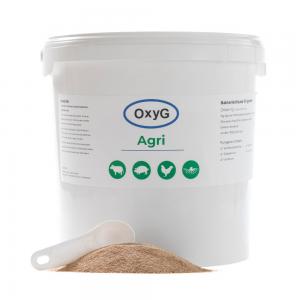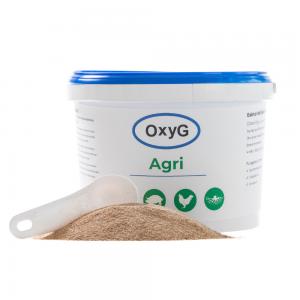- Totalt 0 kr
Bacteria as additives in manure pits.
Advantages:
- Easier to agitate the manure well
- The well stays agitated longer
- Easier and faster to pump manure
- You should be able to run a few m3 more manure per hour with the manure spreding equipment, as the manure flows more easily and faster in the hoses and less blockages in the Equipment and hoses
Bacteria in manure
Oxyg's highly concentrated bacterial mix of aerobic bacteria makes the manure more fluid, greatly reduces odor in stables in all types of manure and improves the economy that exists around manure handling
By adding 8 different Bacillus bacteria to the manure, the bacteria change the microbial process in the decomposition which results in a gradual reduction of odor by the bacteria's enzymes neutralizing the odor. Straw, grass and sawdust are broken down and make the liquid manure more watery and easily pumped. In the decomposition process, the odor must be reduced by 80% or more.
With bacteria, the manure becomes a bit like a biogas manure, the bacteria help to make the nutrients in the manure more easily accessible to be absorbed more quickly by the plant and there with less nutrient losses.
The bacteria can also be growth-stimulating if the microorganisms become the biofilm on the roots that improves the uptake and utilization of nutrients, improves abiotic stress tolerance, and improves the quality of the crop. Goes under the concept of biostimulation
The enzymes from the bacteria used in the decomposition of ham, grass and sawdust in the manure well react with water to form extra ammonium nitrogen and nitrate nitrogen, all according to the Nitrogen Cycle.
The temperature in the manure is important for the activity of the bacteria. At and below 5 degrees Celsius in the water in the manure well, the microbial activity stops considerably. Therefore, it is important that the dosing takes place via the stable's manure chute.
Bacteria as additives in manure pits. Advantages: - A more easily flowing fertilizer - Easier to stir up the manure well - The well stays agitated longer - Easier to pump manure to barrel
Biostimulants containing bacteria, such as Bacillus spp., are used in manure for various reasons, primarily to enhance the biological processes involved in waste decomposition and nutrient transformation. Here are several reasons why bacteria biostimulants, particularly those containing Bacillus strains, might be used in manure management:
Accelerated Decomposition:
Bacillus bacteria are known for their ability to break down complex organic compounds. Adding biostimulants containing Bacillus strains to manure can accelerate the decomposition of organic matter, facilitating the natural breakdown of complex molecules into simpler forms.
Odor Reduction:
Manure can produce unpleasant odors due to the presence of various compounds. Bacillus biostimulants can help mitigate these odors by promoting the breakdown of organic materials responsible for foul smells.
Nutrient Cycling:
Bacillus bacteria play a role in nutrient cycling by converting organic nutrients present in manure into forms that are more readily available for plants. This can improve the nutrient content of the manure and enhance its value as a fertilizer.
Pathogen Suppression:
Some Bacillus strains have been shown to have antagonistic effects against certain pathogens. Incorporating these bacteria into manure may help suppress the growth of harmful microorganisms, reducing the risk of disease transmission.
Enhanced Microbial Diversity:
Introducing Bacillus bacteria to manure can contribute to the overall microbial diversity in the waste. A diverse microbial community is often more resilient and better equipped to handle changes in environmental conditions.
Improved Sludge Digestion:
Bacillus biostimulants can enhance the digestion of sludge in manure lagoons. Sludge is a byproduct of the sedimentation process in lagoons, and promoting its breakdown helps maintain lagoon capacity and efficiency.
Adaptability to Harsh Conditions:
Bacillus bacteria are known for their ability to thrive in a variety of environmental conditions. This adaptability makes them suitable for use in manure management systems that may experience fluctuations in temperature, pH, and other factors.
Reduced Methane Emissions:
Some Bacillus strains have been studied for their potential to reduce methane emissions from anaerobic environments, such as manure lagoons. This aligns with efforts to mitigate greenhouse gas emissions in agriculture.
Biodegradation of Organic Contaminants:
Bacillus bacteria are known for their capacity to biodegrade a range of organic contaminants. Introducing these bacteria to manure may contribute to the breakdown of specific organic compounds, improving the overall quality of the waste.
It's important to note that the effectiveness of Bacillus biostimulants in manure management can depend on various factors, including the specific strains used, application methods, and environmental conditions. Additionally, the use of biostimulants should align with regulatory guidelines and best practices for waste management. Consulting with experts in agriculture, microbiology, and waste management can help ensure the appropriate selection and application of biostimulants in manure systems.



